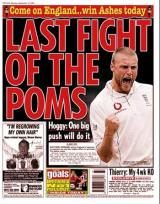How the Ashes infiltrated the language
|
|

|
Cricket writing is full of the same old phrases. We can't help ourselves: it's a hard game to interpret sometimes. Spinners are always wily or guileful, medium-pacers naggingly accurate, Asian batsmen wristy, and cover-drives silky or sumptuous. And that did not change in 2005.
However, this was a summer when Ashes-speak was the talk not just of press boxes but of homes, pubs, offices - and newsrooms. And in the newspapers of Britain, far away from the cricket reports, the game's clichés were everywhere again.
Cricket has long provided the wider English language with a fair smattering of hackneyed phrases. Maidens get bowled over and politicians play a straight bat all the time. But the imagery of the game fell into comparative disuse after a spectacular au revoir in 1990 when Margaret Thatcher was toppled from power in a flurry of cricketing comparisons. Her disgruntled deputy, Sir Geoffrey Howe, accused her of undermining her own government like a captain "breaking the team's bats"; she insisted she would continue to "hit the bowling all round the ground".
In 2005 that sort of cricketing cliché made a spectacular comeback: indeed, the frequency with which the game's lexicon was pillaged by outsiders surely broke all records. It might even have hit them for six.
"On a sticky wicket, the Governor opts for the forward defensive," proclaimed a headline about the Bank of England in the business pages of The Independent on the first morning of the Old Trafford Test, the game where Ashes fever became a diagnosable illness. The article began: "Mervyn King is stumped when it comes to the true state of the economy so for now he'll just keep playing each ball as it comes." The sequence might be awry, but the message was clear: clichés so awful that not even a cricket writer would touch them were fair game for the non-sporting media.
"Dowie seeking to hit rivals for six on Palace's sticky wicket," announced The Times in a report about the manager of Crystal Palace Football Club, even though cricket pitches have generally been covered for decades. The Guardian went further. "No need to try to put a positive spin on this story," it nudged and winked. "Imran Khan, cricketing legend turned politician, is bowled over to have been named the new chancellor at the University of Bradford. He will succeed Baroness Betty Lockwood... Still, she had a good innings. Let's just hope he doesn't find himself on a sticky wicket, eh?"
In all, the 54 days of Ashes competition sparked 15 "sticky wicket" headlines in the UK national papers, compared with just ten in the 201 days between the start of 2005 and the start of the Lord's Test on July 21. Other expressions were proportionally over-represented too, if not quite to the same extent. "Bowled over" cropped up 58 times between January and July, then 32 times during the Ashes. The figures for "hit for six" were 28 - almost exclusively in the tabloids - and 16. "Googly" and its endless, no-giggling at- the-back connotations appeared six times, then seven, including the Daily Mail's mind-boggling "Warne's wife bowls a googly over new home."
The only mercy was that "It's not cricket" was apparently ignored altogether, although readers of the New York Times on the morning of September 18 might have been baffled to see "It wasn't cricket", above a letter complaining that the paper had failed even to mention the Ashes. Back in the real world of cricket writing, the clichés tend to be more subtle. Everyone knows that bounce is always steepling; that turn is always extracted and often sharp; that Pakistanis are mercurial and Bangladeshis hapless; that sixes are launched and boundary-boards bombarded; that longhops are rank; and, above all, that the urn is sacred.
But what became obvious during the Ashes was how certain players kept attracting certain adjectives. A search for "metronomic" threw up 13 usages, of which 12 applied to Glenn McGrath's bowling, and four were followed by "accuracy". And while McGrath spent all summer tick-tocking away, Shane Warne was transporting everyone to a land where time seemed not to exist. Of the 15 instances of "mesmeric" in the national papers, ten were applied to him. And when he was not putting opposition batsmen in a trance, he was being "ebullient" against their bowlers. He was not the only one, although Andrew Flintoff 's "ebullient" count of three was dwarfed by the ten references to him as a "colossus". Kevin Pietersen was invariably "brash".
Other tags revealed deeper truths. Justin Langer scooped up eight of the 16 instances of "nuggety", and of the six other batsmen to be similarly attributed, four - Andrew Strauss, Allan Border, Hugh Morris and Ed Joyce - were or had been left-handers. Had Graham Thorpe played, then the nugget references would probably have doubled.
But the buzz phrase of the summer - one which achieved cliché status in double-quick time - was the claim that cricket was "the new football". So hot was the debate about this sociological conundrum that the words cropped up 92 times during the Ashes. ("The new cricket" was invoked on 11 occasions, mainly by columnists who had spotted the proliferation of "the new football".)
It was a fine example of journalists not only coming to the party, but also putting their hands up and stepping up to the plate (that one a cliché borrowed from baseball). Because, although clichés are two a penny, there could be little doubt after 2005 that they still help the world go round.

